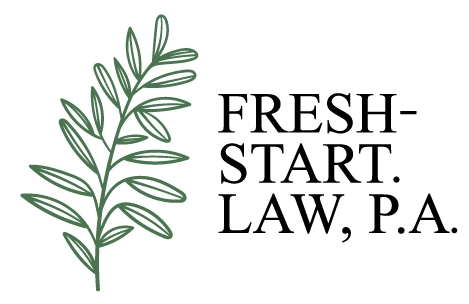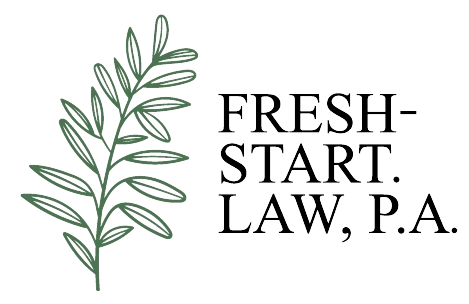How you file bankruptcy is determined by which chapter of the Bankruptcy Code you file under, and your individual circumstances determine what that means. Chapter 7 bankruptcy, otherwise known as liquidation bankruptcy, involves the surrendering of non-exempt assets to pay off debts, and some debts cannot be discharged in this way (although they can be reorganized in other ways). In this article, learn everything you need to know about filing chapter 7 bankruptcy—whether it’s right for you or not. The bills are flooding in, and the credit cards are mounting but the disposable income is not. You can’t catch up and you see no way out. You may even feel frozen! You have the option to file for bankruptcy to make a fresh start. But where do you begin?

Table of Contents
ToggleWhat are the different types of debts? You can have credit card debt, medical debt, tax debts, student loan debt, personal loan debt, and secured debts like car loans and real estate loans. The thing to consider is not all of these are dischargeable. These can result in the most common form of bankruptcy in the United States is Chapter 7. It is designed for individuals who need help getting out from under their unsecured debts. Chapter 7 may be a good option if you have assets that can be sold to pay off some or all of your unsecured debts. However, it won’t help if you are in significant debt because of secured property (such as a car). If this is the case, then Chapter 13 would be more beneficial to you. Chapter 7 will not give you any relief from mortgage payments or child support obligations. These must be addressed during filing with other chapters. Chapter 7 can discharge certain types of government-issued debts such as student loans and unpaid taxes but there are exceptions and exclusions so it’s important to consult an attorney about what will apply to your situation.
Everyone has a unique situation and financial problems are going to look a little different. There are different types of debts and the bankruptcy process can be in depth. Filing for Chapter 7 bankruptcy can help you get a fresh financial start by wiping away most of your debts. You might have personal property or secured property, but the state puts exemptions in place to protect you. The process starts with the filing of a petition and ends with a discharge that could take place as soon as three months later.
A bankruptcy trustee will be appointed to liquidate any nonexempt assets and distribute the proceeds among your creditors. If there are not enough assets, then some or all of your unsecured debts will be discharged. This means that those debts are no longer owed and cannot be collected from you.
If you have secured loans like home mortgages, then the lender would need to agree in writing before any debt is discharged for those loans. Unsecured debts such as credit cards and medical bills can usually be discharged even if the debtor does not qualify for an exception.
In general, chapter 7 bankruptcy will wipe out about 60-70% of your total unsecured debt. Secured debts such as car payments might only drop by 30-50%. Discharging these types of loans also depends on whether you live in certain states where exemptions apply to property values up to certain amounts; this is called homesteading.
Passing the Means Test
Here is Florida’s median income based on household size. Only consumer debts will qualify, not business debts. You can use the forms on the US Bankruptcy Court website to try the means test for yourself.
Passing the means test does not automatically qualify you to file chapter 7. The courts will also look into your taxes and review your Schedule I: Your Income and Schedule J: Your Expenses. They want to be sure there is no additional disposable income that could be used to pay your creditors.
If you have passed the means test, the decision to file should be carefully reviewed. Talk to an attorney and review your specific case carefully. Most team offer a free case evaluation. This is a great opportunity to determine if your case fits with the need to file bankruptcy. You can also read What is a Chapter 13 Bankruptcy?
Florida Median Income Levels
Florida Median Income Standards for Means Test for 2021
Household Size Median Income
1 $50,641
2 $61,619
3 $67,717
4 $81,091
5 $90,091
6+ +$9,000 per individual
What if I Didn’t Pass the Means Test?
This doesn’t mean bankruptcy isn’t an option. You can work with your attorney and plan for filing chapter 13. This means a portion of your disposable income will be worked into a plan that your assigned trustee approves to pay back your creditors equally.
You can file pro se. That means you prepare and file your own bankruptcy petition. It is best to research the process and know what you can and cannot do prior to filing. For instance, you cannot rack up any debt in the 90 days prior to filing. If you pay a friend or family member back within a year of filing or other creditors within a 90-day period, this is called a preferential transfer. The trustee may file to get that money back.
Another option is to hire an attorney. Most team do a free consultation which will enable you to determine your eligibility. You will need to provide the most up-to-date and accurate bank statements, taxes, and paystubs as well as any pertinent financial documents and lawsuits so they can review your entire situation carefully. You must be upfront and honest about everything. An attorney can also advise you on whether you should file chapter 7 or chapter 13. They may also be able to explain to a trustee unusual situations.
There are many benefits of filing for chapter 7 bankruptcy. It’s fast and ends with the discharge of debts. It only takes about 4-6 months from the time you file your petition with the court until you are discharged from your debts, and during this time, creditors cannot take legal action against you. Plus, you don’t have to worry about having a lawyer because it is handled by the court. Additionally, you can keep property like a house or car in most cases. On top of all these benefits, if you have any nonexempt property, the trustee will sell it off in order to pay some of your debt.
While there are many benefits to filing for bankruptcy, there are also drawbacks. For example, if you file for Chapter 7 bankruptcy and you have a car loan or mortgage that is not in your name, then those creditors may still try to collect on the debt. In addition, most assets will be liquidated so that the money can be distributed among the creditors. However, a trustee will oversee the liquidation process and must act in your best interest. Therefore, it would be difficult for them to take advantage of your situation. Furthermore, some states prohibit certain types of property from being taken through this type of bankruptcy proceeding including cars, trucks, trailers; boats; houseboats; mobile homes; horses over $500 worth; household goods, and furnishings up to $15K in value per item plus an additional $15K exemption if two or more people live together as husband and wife (or as registered domestic partners).
Filing a Petition
To file for bankruptcy, you must first fill out a petition and pass the means test. As a general rule, you can only file for bankruptcy if your average monthly income is less than the median income in your state. If that’s not the case, you may still be eligible for a Chapter 13 bankruptcy instead. In this type of case, you’ll propose a payment plan to the bankruptcy court to pay back some of what you owe over three or five years. The petition is where you provide information about your assets and debts. The form will also require information about your income and expenses. After completing the petition, you will need to list the creditors to whom you owe money and how much each creditor is owed. You’ll also be required to list any property that you want to keep from going into bankruptcy. All creditors will be required to stop any further processing with an automatic stay and thus starts your bankruptcy case.
The goal of a chapter 7 bankruptcy is to discharge all of your debts. This means that you will have no remaining balance owed on any of your debt. The catch is that you can only file a chapter 7 bankruptcy if you qualify, and not everyone does. For example, if you owe more than $1,149 or less than $10,475 in secured debt, then you cannot file for this type of bankruptcy. Your income must also be lower than the median income for your state ($12,140). If these conditions are met and you meet other requirements, then filing chapter 7 bankruptcy may be right for you.
There are many things to consider when filing for bankruptcy before the discharged debts. Most importantly, know the laws and deadlines. If you fail to present something by a deadline, it could mean your case gets closed without a discharge. Also, exchanges of money and repayment can become a problem with a trustee. You must be sure to know the laws. Be sure to read about pre-bankruptcy planning and possibly consult an attorney.
Bankruptcy is a public record but it take s a little digging for someone to find out. The best option is to file and inform only who you are comfortable informing. In the end, the clean financial state will be worth it. We, as la lawfirm, offer a credit rebuilding program because it is the best way to get back on your feet with a clean financial slate.
Best Options
It is always best to consult an attorney to be sure you are taking the best steps for your case. You will find that most team offer a free case evaluation. Be ready with any questions you may have, your income, and your debts. Bankruptcy isn’t always the best answer so be sure to get the best information you can before deciding.
You might also like…
Will I lose Everything if I File Bankruptcy?
Who Can File a Chapter 7 Bankruptcy in Florida?
You can read more about us here. Get a free case evaluation to get started!
#meantest #chapter7 #bankruptcy #freeconsultation





